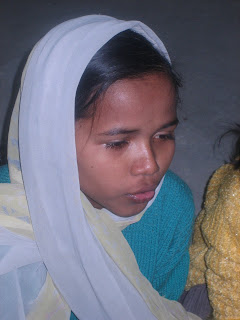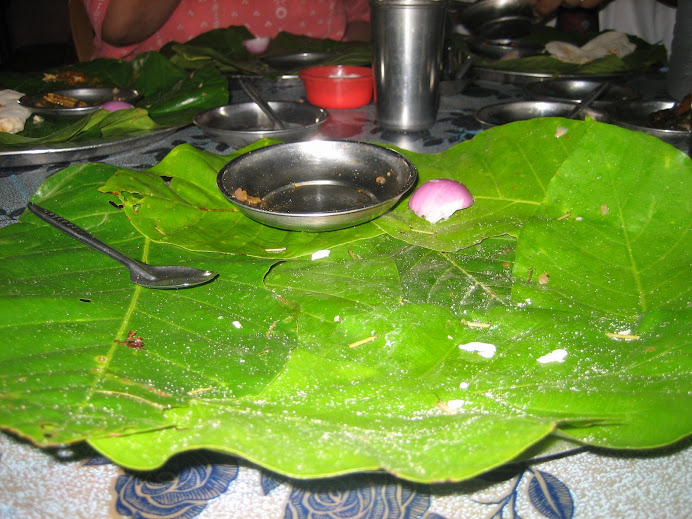
I want to tell you a story about Muleeta.
When I was here last year, Muleeta won my heart. I'm not sure exactly why unless it was because she was so tiny and seemed so vulnerable. She lived in the village closest to the Diocesan Compound and her daughter, Manju attended the Child Study and Development Centre.
Muleeta was in her forties and for lack of a better word, Manju's stepmother. Muleeta was the first wife in the marriage, but since she couldn't have children, wife number two entered the scene. These two women became like sisters and while the second wife gave birth to two children, Muleeta was the one who took care of them, especially Manju.
When I arrived in Durgapur in January, Muleeta was noticeably absent. I asked Manju how her mother was and she told me "Not fine." She went on to tell me that Muleeta had been bowled over by a bull in the market, not Wall Street but Muchipara, and her knee cap had slipped out of place. The family took her to my favorite government run hospital where a doctor pushed the knee cap back into its place. Muleeta was in the hospital a long time but received no medical help and so the family moved her back to the village.
I went to the village to visit Muleeta and found her squatting on the ground, not able to walk at all. Since she was no longer able to get to the market to beg her bread, and wife number two spent her earnings as a construction worker on alcohol, there was nothing for them to eat. I was pretty upset by this so I went to the market and got them some food.
When the second delegation from NC came for their visit, I learned that a doctor was among the group. I asked him if he would check Muleeta out and see what, if anything, could be done to get her back on her feet. He agreed to do this and with a borrowed rickshaw van, Basu, a worker here, and I went to the village to get Muleeta. We loaded her up on the van and headed back to the centre. We located the school's stethoscope and blood pressure cuff and the doctor examined her. All the injuries seemed healed, but what she needed was some simple exercises to strengthen her legs and hopefully, that would get her back on her feet.
So I began going to the village a few mornings a week, and we did leg lifts and bends and with manju and I supporting Muleeta, we got her on her feet and started walking her around the small space in front of her house. I even found a chair back complete with the back legs which I thought might be a good walker. It really worked quite well and Muleeta was able to walk by herself with it.
Then the hostel opened and Manju left the village and moved into the hostel, leaving Muleeta pretty much at home alone. I continued going to the village and soon picked up another client, Khandi, a seventy something woman whom I had met last year. She was complaining about her back hurting and so I started giving her a back massage. Well, now I am a physical therapist and a massage therapist, and I have absolutely no idea what I am doing. But Muleeta is making progress, and she is excited about being able to walk even though it is with help, and she does seem to be getting stronger. Khandi enjoys her massage and even under my untrained hands, I can feel the tightness in her back ebbing somewhat.
To fully appreciate this story you have to know what these women look like. First of all they stand about 3' tall. They both have short, wild, gray hair, and they both wear the white sari of the widow. Sometime they wear the little sari blouse under the sari, but most of the time, they don't, or if they do, the blouse isn't buttoned so it doesn't really make a difference. Basically, they are exposed from the waist up although they attempt to stay covered with the end of the sari that goes over the shoulder. Half the time, Muleeta can't keep her sari tucked in very well so she is losing it a lot. These saris could stand a good washing, but I don't think they have anything else to wear. It would be comical if it weren't so sad.
One day when I arrive at the village, Khandi is there and begins to gather her styrofoam mat, some packing material she has scavenged, getting ready for her massage. Muleeta is not in her usual spot and I ask about her. Khandi tells me that Muleeta is not well and she is sleeping. After the massage and some simple exercises, I check on Muleeta. She is being plagued by a stomach thing and hasn't eaten or drunk anything for awhile.
I go back to the centre and pick up some safe water, a banana, make some toast, grab some hand sanitizer and head back to the village. Manju is with me and we get her to drink some of the water. We leave her resting.
The next morning, Manju and I take her another banana and some rehydration salts. She actually eats the banana and drinks some of the salts and I am feeling encouraged. Later in the morning, Manju's bio mom comes to the centre where she has been working on the cathedral, but instead of working she squats down at the sand pile and begins crying. Basu comes to get me and tells me that Muleeta isn't drinking anything and she isn't talking.
I head back to the village and find Muleeta very weak and cold to the touch. When I get back to the centre, I have Mrs. Kobiraj call some doctors she knows, but they are all out of station. Getting her to the hospital isn't out of the question, but there is no one to stay with her. I offer my mornings, but the villagers decide to call a doctor from a town which is a considerable distance from Durgapur, and he won't come until the evening.
At 2:30, Mrs. Kobiraj and I go back to the village and Muleeta is not good at all. She is thrashing about and grabbing at anything close to her, and she is very cold to the touch. I should recognize these signs by now, but I bury the recognition in the hope that she will get better. We go back to the centre and a very short time later, maybe thirty minutes, Manju's mom comes to the centre to tell us that Muleeta has died. Just like that. Gone.
Back we go. Manju and I go into the little hut where Muleeta is lying on her thin mat on the hard ground. I lift the cover from her face and I'm amazed at how different she looks in death, more like the forty years she was than the sixties look she carried through life. All the pain and anxiety has melted from her face, and she truly does look peaceful.
The little group of villagers gathered around the hut start giving orders about the things that need to be done. First, the body must be removed from the house. The only space to put her is filled with kindling, so we begin moving it to another
spot. The villagers are only too happy to direct this process but not willing to participate in it. Then Manju, her mom, and I lift Muleeta from her bed and carry her to her resting place. Moving her is awkward because the hut is dark and the ceiling is so low even I cannot stand up straight, but we get her moved.
Manju hands me the incense sticks and the little incense holder. She lights the sticks and puts them in the holder. Then I place the holder close to Muleeta's head on what I hope is a level enough spot to keep the holder from toppling over.
We keep a short vigil and then leave. Already there are men there collecting information and the papers needed to get Muleeta buried.
I miss Muleeta. I feel so helpless here in this place where Death just hangs out waiting for someone to become weak so he can make his move.
The days of mourning are over, Manju is back at the hostel, and life in the village has returned to its definition of normalcy. I still go and massage Khandi's back and lead her through some simple exercises, but I am very much aware of Muleeta's presence in that little space in front of her hut where she spent so many hours just squatting.
The picture is of Manju.


No comments:
Post a Comment